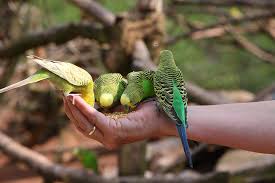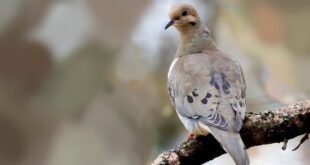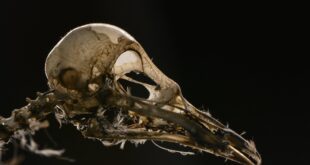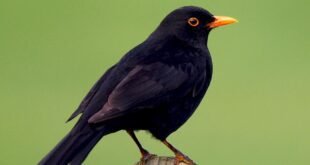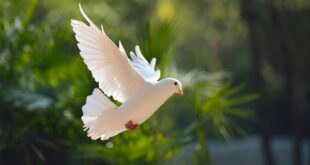Can parakeets eat wild bird food? Technically, yes, but there’s more to the story.
Join us as we chirp about the do’s and don’ts of feeding these feathered friends and how to make their dining experience tweet-worthy!
Parakeets And Wild Bird Food
Can parakeets eat wild bird food?
While wild bird food may seem like a convenient option for feeding your parakeet, it’s important to be cautious.
Wild bird food, typically sold as birdseed mixes or suet cakes, is formulated for wild birds and may not provide the complete and balanced nutrition that parakeets require.
Wild bird food often contains a variety of seeds, grains, and nuts that may not be suitable for parakeets due to their specific dietary needs.
One of the main concerns with feeding parakeets wild bird food is the potential for an imbalance in their diet.
Parakeets have specific requirements for the types and amounts of nutrients they need, and an unbalanced diet can lead to health issues such as obesity, malnutrition, and vitamin deficiencies.
Wild bird food may also contain additives or preservatives that can be harmful to parakeets, as they have different digestive systems compared to wild birds.
Another concern is the potential for contamination in wild bird food.
Wild bird food is often stored and transported in outdoor environments where it can be exposed to pests, rodents, and other contaminants.
These contaminants can pose a health risk to parakeets if they consume the contaminated wild bird food.
Furthermore, wild bird food may not be specifically formulated to meet the unique needs of parakeets.
Parakeets have specific requirements for the types and amounts of nutrients they need, including vitamins, minerals, and proteins.
Feeding them a diet solely based on wild bird food may not provide them with the complete and balanced nutrition they need for optimal health.
In addition, wild bird food may also contain ingredients that are unsafe or potentially toxic to parakeets.
For example, some wild bird food mixes contain peanuts, which can be harmful to parakeets as they are prone to peanut allergies.
Other ingredients such as dried fruits, corn, or safflower seeds may be high in sugars or unhealthy fats, which can lead to obesity and other health issues in parakeets if consumed in excess.
It’s important to note that parakeets have evolved to have different dietary needs compared to wild birds.
While wild birds have adapted to survive on a varied diet based on their natural environment, parakeets have been domesticated and have different requirements for optimal health in captivity.
Therefore, it’s crucial to provide a well-balanced and species-specific diet to ensure the well-being of your pet parakeet.
Parakeet Diet
Before we delve into whether parakeets can eat wild bird food, let’s first understand their dietary needs.
Parakeets are omnivorous birds, which means they can eat both plant-based and animal-based foods.
In the wild, their diet consists of a variety of seeds, fruits, vegetables, and insects.
As pets, their diet should be similarly balanced and include a variety of foods to ensure they get all the essential nutrients they need to thrive.
A healthy parakeet diet should consist of:
1. Seeds: High-quality parakeet seed mixtures that are specifically formulated for their dietary needs are a staple in their diet.
These can include a combination of millet, canary grass seed, sunflower seeds, and others.
Seeds are a good source of healthy fats, proteins, and carbohydrates for parakeets.
2. Fresh fruits and vegetables: Parakeets should be offered a variety of fresh fruits and vegetables daily to provide them with essential vitamins, minerals, and fiber.
Examples of safe fruits and vegetables for parakeets include apples, oranges, carrots, broccoli, spinach, and bell peppers.
It’s important to wash and remove any seeds or pits from fruits before feeding them to your parakeet, as some seeds and pits can be toxic to birds.
3. Pellets: Pelleted food can also be a part of a parakeet’s diet.
Pellets are nutritionally balanced and can provide a consistent source of essential nutrients.
However, not all pellets are created equal, and it’s important to choose high-quality, veterinarian-recommended pellets that are specifically formulated for parakeets.
4. Protein: Parakeets are omnivorous and require a source of protein in their diet.
This can include cooked eggs, cooked chicken, and mealworms.
Protein is essential for muscle development and overall health in parakeets.
5. Water: Fresh, clean water should be available to your parakeet at all times.
It’s important to change the water daily and clean the water dish to prevent the growth of harmful bacteria.
How To Convert Your Parakeet To A Pelleted Diet
If you have been feeding your parakeet wild bird food or are considering doing so, it’s important to transition them to a balanced and nutritious diet that meets their specific needs.
One recommended option is to gradually convert your parakeet to a pelleted diet.
Pelleted food is specifically formulated to meet the nutritional requirements of parakeets and can provide a consistent source of essential nutrients.
Here are some steps to help you transition your parakeet to a pelleted diet:
Gradual Transition:
Start by mixing a small amount of pelleted food with your parakeet’s current diet.
This can be done by gradually increasing the proportion of pelleted food over several weeks.
This slow transition allows your parakeet to adjust to the new taste and texture of the pelleted food.
Variety of Pelleted Food:
Offer different brands and types of pelleted food to your parakeet to see which one they prefer.
Pellets come in various shapes, sizes, and flavors, and it’s important to find a brand and type that your parakeet enjoys.
Monitoring Food Intake:
Keep an eye on your parakeet’s food intake during the transition.
Ensure that they are eating enough and not picking out only the seeds or other components of the diet.
You may need to adjust the ratio of pelleted food to their previous diet to encourage them to eat the pelleted food.
Remove Wild Bird Food:
During the transition, it’s important to gradually phase out the wild bird food from your parakeet’s diet.
Remove any wild bird food from their food dishes and offer only the pelleted food, fresh fruits, vegetables, and other recommended foods.
Provide Fresh Water:
Fresh water should always be available to your parakeet. Make sure to clean their water dish daily and provide clean, fresh water to promote hydration and digestion.
Consult with a Veterinarian:
It’s always a good idea to consult with a veterinarian who has experience with avian care before making any changes to your parakeet’s diet.
A veterinarian can provide personalized recommendations based on your parakeet’s health condition, age.
How To Feed Parakeets With Wild Bird Food
When it comes to feeding parakeets with wild bird food, it’s important to ensure they receive a balanced diet to keep them healthy and happy.
Here are some tips on how to feed parakeets with wild bird food:
Give Your Bird Balance:
Just like humans, parakeets need a balanced diet to thrive.
Wild bird food often consists of a mix of seeds, grains, and other ingredients.
It’s essential to provide your parakeet with a diverse array of wild bird food to ensure they get a variety of nutrients.
This can include seeds such as sunflower seeds, millet, and safflower seeds, as well as grains like corn and wheat.
Parakeet Food:
In addition to wild bird food, it’s important to also offer your parakeet specially formulated parakeet food.
Parakeet food is specifically designed to meet the nutritional needs of these birds, and it usually comes in the form of pellets or mixes.
Pellets can be a good option as they provide a balanced diet in a single food source, reducing the risk of selective eating.
See Also: 10 Funniest Bird Feeder Memes
Give Low-Fat Seeds:
While seeds are an important part of a parakeet’s diet, it’s important to be mindful of the type of seeds you offer.
High-fat seeds, such as sunflower seeds, should be given sparingly as they can contribute to weight gain and other health issues.
Instead, opt for low-fat seeds such as millet, which are a healthier option for parakeets.
Offer Fresh Fruits And Vegetables:
In addition to wild bird food and parakeet food, fresh fruits and vegetables should also be included in your parakeet’s diet.
These provide important vitamins, minerals, and antioxidants that can support your bird’s overall health. Some suitable options include carrots, broccoli, apples, and spinach.
Just be sure to wash them thoroughly and remove any seeds or pits that may be toxic to birds.
Provide Clean Water:
Water is essential for parakeets, and it’s important to provide them with clean, fresh water at all times.
Change the water in their drinking bowl daily to ensure it remains clean and free from bacteria.
Avoid Feeding Harmful Foods:
There are certain foods that can be harmful or toxic to parakeets and should be avoided.
These include chocolate, caffeine, alcohol, avocados, and high-salt foods.
Stick to a diet that consists of wild bird food, parakeet food, fresh fruits, and vegetables to ensure your parakeet stays healthy.
Can Budgies Eat Wild Bird Seed?
Budgies, also known as parakeets, are small birds that are commonly kept as pets.
As omnivorous birds, they can eat a variety of foods including seeds, grains, fruits, and vegetables.
However, when it comes to wild bird seed, caution should be exercised.
The Most Important Thing To Know!
While it is possible for budgies to eat wild bird seed, it may not be the most ideal option for their diet.
Wild bird seed mixtures are typically formulated for larger wild birds such as pigeons, doves, and finches, which have different nutritional needs compared to budgies.
Wild bird seed mixtures can be high in fat and may not provide the balanced nutrition that budgies require for optimal health.
What Are Wild Bird Seeds?
Wild bird seeds are a mixture of various seeds and grains that are commonly used as food for wild birds in their natural habitats.
These seed mixtures can typically be found in stores and are intended to attract a wide range of wild bird species to bird feeders in gardens or other outdoor areas.
Wild bird seeds can contain a variety of seeds such as sunflower seeds, millet, corn, wheat, and others.
What Is Wild Bird Food, And What Does It Contain?
Wild bird food, on the other hand, refers to formulated bird food that is specifically designed to meet the nutritional needs of wild birds.
These formulated foods typically come in the form of pellets or mixes and are created to provide a balanced diet for specific bird species, taking into account their nutritional requirements.
Wild bird food can contain a variety of ingredients such as seeds, grains, fruits, vegetables, and even insects.
The ingredients are carefully selected to provide the necessary nutrients, including proteins, vitamins, and minerals, for the birds’ overall health and well-being.
Can Budgies Eat Wild Bird Seed?
Budgies, also known as parakeets, are small birds that have specific dietary requirements to maintain optimal health.
Wild bird seed may not be the most suitable option for their diet.
Is Wild Bird Seed Safe For Budgies?
While wild bird seed is not toxic to budgies, it may not provide the ideal nutrition for them.
Wild bird seed mixtures are typically formulated for larger wild birds and may contain seeds that are high in fat, which can be detrimental to budgies’ health if consumed in excess.
Additionally, wild bird seed may lack the balanced nutrition that budgies require for their specific dietary needs.
What Alternative Foods Can Budgies Eat Instead Of Wild Bird Food?
Budgies can thrive on a well-rounded diet that includes a variety of foods.
Here are some alternative foods that are safe and suitable for budgies:
1. Commercial Budgie Food: Specifically formulated budgie food, available in pet stores, can provide a balanced and nutritionally complete diet for budgies.
These foods are usually in the form of pellets and contain a mix of seeds, grains, and other essential nutrients.
2. Fresh Fruits And Vegetables: Budgies can enjoy a variety of fresh fruits and vegetables, such as apples, carrots, spinach, and broccoli.
These provide important vitamins, minerals, and fiber to their diet.
3. Seeds And Grains: While wild bird seed may not be the best option, budgies can still have a variety of seeds and grains in moderation, such as millet, flaxseed, and quinoa.
4. Cooked Eggs: Cooked eggs can be a good source of protein for budgies.
Ensure that the eggs are fully cooked and cooled before feeding them to your budgie.
What Is In Wild Bird Food?
Wild bird food typically contains a mixture of seeds, grains, and other ingredients that are designed to attract a variety of wild bird species.
These can include sunflower seeds, millet, corn, wheat, and other seeds and grains.
Can Parakeets Eat Wild Bird Food?
Parakeets, including budgies, can technically eat wild bird food, but it is not recommended as a staple part of their diet.
As mentioned earlier, wild bird food may not provide the balanced nutrition that parakeets require for their specific dietary needs.
Health Benefits Of Feeding Your Parakeet Wild Bird Food
Feeding wild bird food to parakeets may not offer significant health benefits.
Parakeets have specific nutritional requirements that may not be fully met by wild bird food, which is formulated for larger birds.
It is important to provide parakeets with a balanced and nutritionally complete diet that is tailored to their specific needs.
Common Types Of Wild Bird Foods To Avoid For Parrots
Parrots, including pet parrots, have specific dietary requirements that may differ from those of wild birds.
While some wild bird foods may be safe for parrots, there are certain types that should be avoided.
Nuts And Seeds To Avoid For Pet Birds
Not all nuts and seeds are safe for parrots, and some may even be toxic to them.
Here are some common nuts and seeds that should be avoided when feeding a pet parrot:
1. Avocado: Avocado contains a toxic compound called persin, which can be harmful to parrots and other birds.
Avoid feeding avocados or any food products containing avocados to your pet parrot.
2. Chocolate: Chocolate contains a substance called theobromine, which is toxic to birds and can cause serious health issues.
Avoid feeding any chocolate or chocolate-based products to your pet parrot.
3. High-Fat Seeds: Some seeds, such as sunflower seeds and safflower seeds, are high in fat and can lead to obesity and other health problems in parrots if consumed in excess.
Limit the intake of high-fat seeds in your pet parrot’s diet and provide them in moderation.
4. Uncooked Beans: Raw beans contain a toxic compound called lectin, which can be harmful to birds, including parrots.
Ensure that all beans fed to your pet parrot are thoroughly cooked and cooled before offering them as a treat.
Dried Fruits That Should Be Avoided When Feeding A Pet Parrot
Dried fruits can be a healthy and tasty treat for humans, but not all dried fruits are safe for parrots.
Here are some dried fruits that should be avoided when feeding a pet parrot:
1. Raisins and Currants: Raisins and currants can be harmful to parrots as they can cause kidney failure in birds.
Avoid feeding raisins or currants to your pet parrot.
2. Dried Apricots: Dried apricots can be high in sulfur dioxide, which can be toxic to birds.
It is best to avoid feeding dried apricots or any other dried fruits that contain sulfur dioxide to your pet parrot.
3. Dried Cherries: Dried cherries can contain pits that are toxic to birds and can cause choking hazards.
Avoid feeding dried cherries or any other dried fruits with pits to your pet parrot.
FAQS
Can Parakeets Eat Birdseed?
Yes, parakeets, also known as budgerigars or budgies, can eat birdseed.
However, it is important to ensure that the birdseed is specifically formulated for parakeets and is free from any harmful additives or pesticides.
Commercially available parakeet seed mixes can be a part of a balanced diet for parakeets,
but they should not be the sole source of nutrition for these birds.
What Can Parakeets Eat Other Than Bird Food?
Parakeets can eat a variety of foods other than bird food to maintain a healthy and balanced diet.
Some options for parakeet-friendly foods include:
1. Fresh Fruits and Vegetables: Parakeets can eat a variety of fresh fruits and vegetables, such as apples, carrots, broccoli, spinach, and grapes.
These should be washed thoroughly and offered in small, bite-sized pieces.
2. Pellets: Commercially available pelleted diets formulated specifically for parakeets can provide a well-rounded source of nutrition for these birds.
Pellets can be offered alongside other fresh foods as part of a balanced diet.
3. Cooked Grains and Legumes: Parakeets can also eat cooked grains, such as rice and quinoa, as well as cooked legumes, such as lentils and beans.
These should be prepared without any added salt or seasoning.
4. Fresh Water: Clean, fresh water should be provided to parakeets at all times to ensure proper hydration.
What Do Parakeets Eat In The Wild Diet?
In the wild, parakeets primarily feed on a variety of seeds, including grass seeds, weed seeds, and other plant seeds.
They may also consume some insects and their larvae as a source of protein.
However, the specific diet of parakeets in the wild can vary depending on their natural habitat and availability of food sources.
What Is Toxic To Parakeets?
Parakeets are sensitive to certain foods and substances that can be toxic to them.
Some examples of toxic foods for parakeets include:
1. Avocado: Avocado contains a toxic compound called persin, which can be harmful to parakeets and other birds.
Avoid feeding avocados or any food products containing avocados to your parakeet.
2. Chocolate: Chocolate contains theobromine, which is toxic to birds, including parakeets. Avoid feeding any chocolate or chocolate-based products to your parakeet.
3. Alcohol and Caffeine: Alcohol and caffeine can be toxic to parakeets and should be avoided.
4. High-Fat and Salty Foods: Parakeets have specific dietary requirements and should not be fed high-fat or salty foods, as they can lead to health issues such as obesity and kidney problems.
What Do Parakeets Hate The Most?
As birds, parakeets do not necessarily “hate” anything, but they may be fearful or uncomfortable with certain things or situations.
Parakeets are prey animals and may be afraid of loud noises, sudden movements, or unfamiliar objects or people.
It is important to provide a calm and safe environment for your parakeet to help them feel comfortable and secure.
What Not To Do With Parakeets?
When caring for parakeets, there are certain things that should be avoided to ensure their health and well-being.
Some examples of what not to do with parakeets include:
1. Feeding an Unbalanced Diet: Parakeets require a balanced and varied diet to thrive.
Avoid feeding them an unbalanced diet that consists solely of birdseed or other unhealthy foods.
2. Ignoring Social Interaction: Parakeets are social birds and require regular interaction and mental stimulation.
Avoid neglecting social interaction with your parakeet, as it can lead to boredom and behavioral problems.
3. Exposing to Harmful Substances: Parakeets should be kept away from harmful substances such as smoke, fumes,
toxic chemicals, and pesticides, as these can have detrimental effects on their respiratory system and overall health.
4. Handling Roughly: Parakeets are delicate birds and should be handled gently to avoid injury.
Avoid handling them roughly or gripping them too tightly, as this can cause stress, fear, and injury.
5. Neglecting Regular Veterinary Care: Parakeets should receive regular veterinary care, including check-ups and vaccinations, to ensure their health and well-being.
Avoid neglecting their veterinary care and seek professional help if your parakeet shows any signs of illness or distress.
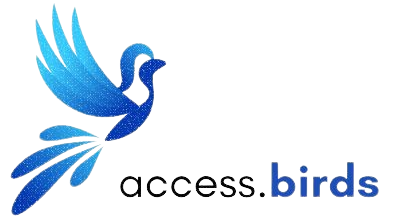 Access Birds Let’s Make The World A Happier, Healthier Place For Birds.
Access Birds Let’s Make The World A Happier, Healthier Place For Birds.
